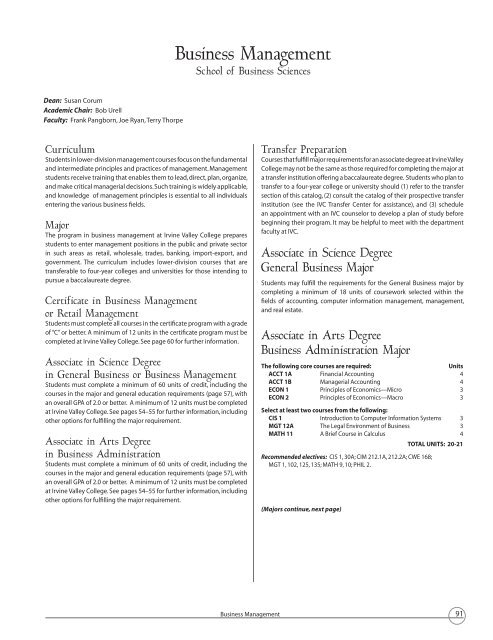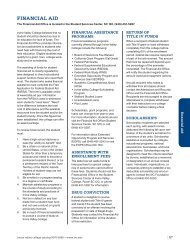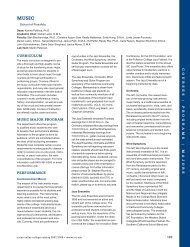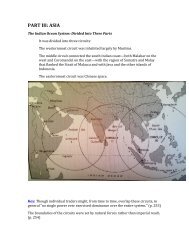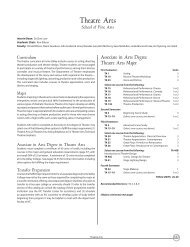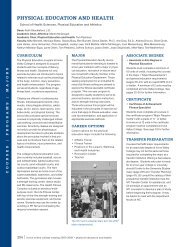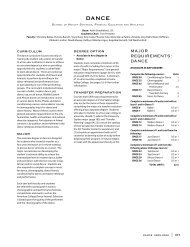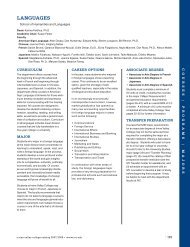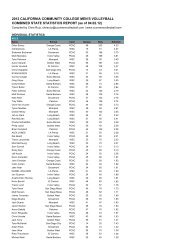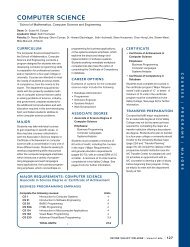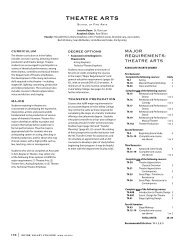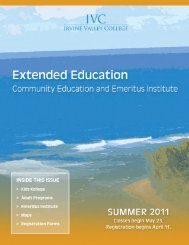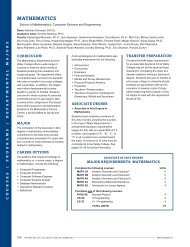mgt - Irvine Valley College
mgt - Irvine Valley College
mgt - Irvine Valley College
Create successful ePaper yourself
Turn your PDF publications into a flip-book with our unique Google optimized e-Paper software.
Business Management<br />
School of Business Sciences<br />
Dean: Susan Corum<br />
Academic Chair: Bob Urell<br />
Faculty: Frank Pangborn, Joe Ryan, Terry Thorpe<br />
Curriculum<br />
Students in lower-division management courses focus on the fundamental<br />
and intermediate principles and practices of management. Management<br />
students receive training that enables them to lead, direct, plan, organize,<br />
and make critical managerial decisions. Such training is widely applicable,<br />
and knowledge of management principles is essential to all individuals<br />
entering the various business fields.<br />
Major<br />
The program in business management at <strong>Irvine</strong> <strong>Valley</strong> <strong>College</strong> prepares<br />
students to enter management positions in the public and private sector<br />
in such areas as retail, wholesale, trades, banking, import-export, and<br />
government. The curriculum includes lower-division courses that are<br />
transferable to four-year colleges and universities for those intending to<br />
pursue a baccalaureate degree.<br />
Certificate in Business Management<br />
or Retail Management<br />
Students must complete all courses in the certificate program with a grade<br />
of “C” or better. A minimum of 12 units in the certificate program must be<br />
completed at <strong>Irvine</strong> <strong>Valley</strong> <strong>College</strong>. See page 60 for further information.<br />
Associate in Science Degree<br />
in General Business or Business Management<br />
Students must complete a minimum of 60 units of credit, including the<br />
courses in the major and general education requirements (page 57), with<br />
an overall GPA of 2.0 or better. A minimum of 12 units must be completed<br />
at <strong>Irvine</strong> <strong>Valley</strong> <strong>College</strong>. See pages 54–55 for further information, including<br />
other options for fulfilling the major requirement.<br />
Associate in Arts Degree<br />
in Business Administration<br />
Students must complete a minimum of 60 units of credit, including the<br />
courses in the major and general education requirements (page 57), with<br />
an overall GPA of 2.0 or better. A minimum of 12 units must be completed<br />
at <strong>Irvine</strong> <strong>Valley</strong> <strong>College</strong>. See pages 54–55 for further information, including<br />
other options for fulfilling the major requirement.<br />
Transfer Preparation<br />
Courses that fulfill major requirements for an associate degree at <strong>Irvine</strong> <strong>Valley</strong><br />
<strong>College</strong> may not be the same as those required for completing the major at<br />
a transfer institution offering a baccalaureate degree. Students who plan to<br />
transfer to a four-year college or university should (1) refer to the transfer<br />
section of this catalog, (2) consult the catalog of their prospective transfer<br />
institution (see the IVC Transfer Center for assistance), and (3) schedule<br />
an appointment with an IVC counselor to develop a plan of study before<br />
beginning their program. It may be helpful to meet with the department<br />
faculty at IVC.<br />
Associate in Science Degree<br />
General Business Major<br />
Students may fulfill the requirements for the General Business major by<br />
completing a minimum of 18 units of coursework selected within the<br />
fields of accounting, computer information management, management,<br />
and real estate.<br />
Associate in Arts Degree<br />
Business Administration Major<br />
The following core courses are required:<br />
Units<br />
ACCT 1A Financial Accounting 4<br />
ACCT 1B Managerial Accounting 4<br />
ECON 1 Principles of Economics—Micro 3<br />
ECON 2 Principles of Economics—Macro 3<br />
Select at least two courses from the following:<br />
CIS 1 Introduction to Computer Information Systems 3<br />
MGT 12A The Legal Environment of Business 3<br />
MATH 11 A Brief Course in Calculus 4<br />
Recommended electives: CIS 1, 30A; CIM 212.1A, 212.2A; CWE 168;<br />
MGT 1, 102, 125, 135; MATH 9, 10; PHIL 2.<br />
(Majors continue, next page)<br />
TOTAL UNITS: 20-21<br />
Business Management 91
Associate in Science Degree Major or<br />
Certificate in Business Management<br />
Complete the following courses:<br />
Units<br />
ACCT 1A Financial Accounting 4<br />
CIM 107.1A Introduction to Personal Computer Applications 3<br />
MGT 1 Introduction to Business 3<br />
MGT 12A The Legal Environment of Business 3<br />
MGT 103 Business English 3<br />
MGT 125 Human Relations in Business 3<br />
MGT 135 Introduction to Marketing 3<br />
TOTAL UNITS: 22<br />
Recommended electives: ACCT 114; CIM 100A, 212.1A; CWE 168; ECON 1, 2;<br />
MGT 102, 104, 115, 268, 288; WR 1.<br />
MANUFACTURI NG ASSISTANT EMPHASIS<br />
Complete the following courses:<br />
Units<br />
CWE 168 Cooperative Work Experience 2-4<br />
MGT 103 Business English 3<br />
MGT 125 Human Relations in Business 3<br />
MATH 10 Introduction to Statistics 3<br />
ENGT 140 Manufacturing Processes—Systems Introduction 3<br />
Select one of the following courses:<br />
CIM 107.1A Introduction to Personal Computer Applications 3<br />
CIM 212.1A Spreadsheets I 1.5<br />
CIM 212.2A Spreadsheets II 1.5<br />
Select one of the following courses:<br />
MGT 102 Public Speaking for Business 3<br />
SP 1 Communication Fundamentals 3<br />
SUPERVISION EMPHASIS<br />
TOTAL UNITS: 18-22<br />
Select a minimum of 18 units from the following:<br />
Units<br />
CIM 210.1A Word Processing 1.5<br />
CIM 212.1A Spreadsheets I 1.5<br />
MGT 1 Introduction to Business 3<br />
SP 1 Communication Fundamentals 3<br />
OR<br />
MGT 102 Public Speaking for Business 3<br />
MGT 103 Business English 3<br />
MGT 104 Business Communication 3<br />
MGT 115 Managing a Culturally Diverse Work Force 3<br />
MGT 125 Human Relations in Business 3<br />
MGT 288 Human Reources Management 3<br />
TOTAL UNITS: 18<br />
Recommended electives: ACCT 1A, 114, 215; CIM 100A, 212.2A, 214.1A;<br />
CWE 168; ECON 1; MGT 12A.<br />
Certificate in Retail Management<br />
The Retail Management program, designed by managers of major retail<br />
corporations, prepares individuals to be effective managers or to be<br />
promoted to management in the retail industry. The courses assist students<br />
in understanding the scope of the retail manager’s job and the requirements<br />
for success. Completion of the certificate enhances one’s opportunity for entrylevel<br />
employment as well as advancement in a variety of retail careers.<br />
The Western Association of Food Chains (WAFC) has endorsed this program.<br />
Current grocery industry associates are encouraged to contact their Human<br />
Resources office for details on the WAFC program.<br />
GROUP A—Foundation Courses<br />
Units<br />
MGT 104 Business Communication 3<br />
ACCT 114 Business Math 3<br />
CIM 107.1A Introduction to Personal Computer Applications 3<br />
MGT 102 Public Speaking for Business 3<br />
OR<br />
SP 1 Communication Fundamentals 3<br />
GROUP B—Intermediate Courses<br />
MGT 120 Principles of Business Management 3<br />
ACCT 1A Financial Accounting 4<br />
MGT 135 Introduction to Marketing 3<br />
GROUP C—Advanced Courses<br />
MGT 282 Retail Management 3<br />
MGT 125 Human Relations in Business 3<br />
MGT 288 Human Resource Management 3<br />
Courses<br />
Management (Business)<br />
TOTAL UNITS: 31<br />
CWE 168: Cooperative Work Experience: Management<br />
1–4 Units<br />
1–4 hours lecture<br />
Prerequisite: Students must have taken or must be currently taking a course in<br />
college-level business management. Limitation: Students must be concurrently<br />
enrolled in 7 units, including CWE. Application must be approved by CWE<br />
coordinator.<br />
This course provides students an opportunity for supervised work experience.<br />
Students extend their classroom-based occupational learning by working at a<br />
job related to their major and to their occupational goal. Student, instructor,<br />
and employer will cooperatively develop a minimum of three learning<br />
objectives. One unit of credit will be awarded for each 75 hours of paid or<br />
60 hours of volunteer employment for successful completion of learning<br />
objectives, and for attendance at scheduled seminar sessions. A maximum of<br />
four units may be applied toward major requirements or a certificate. R-I-3<br />
Management (General)<br />
MGT 1: Introduction to Business<br />
3 Units<br />
3 hours lecture<br />
This course presents a survey of the history, organization, and functions of<br />
business and promotes an awareness of business as an important element<br />
in society. Course topics include the growth of American business, types of<br />
organizations, forms of ownership, management systems and controls, basic<br />
finance, and career opportunities in business. NR<br />
92 <strong>Irvine</strong> <strong>Valley</strong> <strong>College</strong> Catalog 2003–2004
MGT 12A: The Legal Environment of Business<br />
3 Units<br />
3 hours lecture<br />
This course focuses on the legal system and its effects on the business<br />
environment, including its effects on managerial decision making and<br />
methods of resolving disputes. Topics include the sources of law; the law’s<br />
impact on society and business; the implications of legal ethics in the<br />
business environment; business and personal torts and crimes; the regulatory<br />
environment; labor and management issues; and international business. (CAN<br />
BUS 12) NR<br />
MGT 102: Public Speaking for Business<br />
3 Units<br />
3 hours lecture<br />
This course is designed to increase students’ communication skills, both<br />
verbal and nonverbal. Students will be required to do research, develop<br />
outlines, and deliver platform presentations on topics related to business.<br />
Students will develop skills in listening critically; learn to take a position on<br />
a business topic and express that position; and deliver oral presentations,<br />
adapting their presentations to specific audiences. Students will learn to plan,<br />
prepare, research, and organize business presentations. Students will become<br />
familiar with the use of visual aids in a business presentation. Stress reduction<br />
techniques and voice diction will be taught and analyzed. NR<br />
MGT 103: Business English<br />
3 Units<br />
3 hours lecture<br />
This course provides a comprehensive review of the fundamental principles<br />
of written and spoken English as used in business, professional, or technical<br />
settings. The course studies the conventions of English grammar, sentence<br />
structure, punctuation, mechanics, word usage, paragraph construction, and<br />
style. NR<br />
MGT 104: Business Communication<br />
3 Units<br />
3 hours lecture<br />
Prerequisite: Wr. 1.<br />
This course studies the principles of effective writing as they apply to business<br />
documents. Students will concentrate on writing clear, well-structured letters,<br />
intracompany communications, and formal and informal business reports. NR<br />
MGT 115: Managing a Culturally Diverse Work Force<br />
3 Units<br />
3 hours lecture<br />
This course examines the interpersonal and managerial skills needed to<br />
manage a culturally diverse work force. A primary focus is placed upon the<br />
impact of various historical, social, and cultural experiences and perspectives<br />
on the work place. The course also presents an analysis of current corporate<br />
policies and applicable state and federal legislation as they apply to cultural<br />
diversity in the work force. NR<br />
MGT 120: Principles of Business Management<br />
3 Units<br />
3 hours lecture<br />
This course surveys business management principles and practices. It includes<br />
a study of organizational structures; the management functions of planning,<br />
organizing, coordinating and controlling; and managerial decision-making<br />
processes. NR<br />
MGT 125: Human Relations in Business<br />
3 Units<br />
3 hours lecture<br />
In this course behavioral science concepts are applied to the management<br />
and development of human resources in the social sub-group of business<br />
organizations. The course focuses on the ways people act in response to their<br />
working environment; creates an awareness of policies and actions which<br />
prevent or resolve problems among individuals within groups; develops<br />
methods of inquiry used through a study of current management techniques;<br />
and stimulates critical thinking about human organizational problems and<br />
solutions aimed at greater productivity of the individual or group. NR<br />
MGT 174A: Job-Search Strategies<br />
.5 Unit<br />
.5 hours lecture<br />
This course focuses on how to organize and conduct a job search. Topics<br />
include defining current job targets, developing contacts, using employment<br />
information resources, developing record-keeping and time-planning systems,<br />
and initiating contact with prospective employers. This course is also listed as<br />
Applied Psychology 174A; credit will be given in either area, but not both. NR<br />
MGT 174B: Resume Writing<br />
.5 Unit<br />
.5 hours lecture<br />
This course is a comprehensive introduction to the resume writing process.<br />
Topics include clarifying a specific job target, selecting the most effective<br />
resume format, identifying relevant qualifications and experience, developing<br />
marketing language skills, preparing cover letters, electronic resume scanning<br />
and distribution, and resume software packages. This course is also listed as<br />
Applied Psychology 174B; credit will be given in either area, but not both. NR<br />
MGT 174C: Interviewing Techniques<br />
.5 Unit<br />
.5 hours lecture<br />
This course is designed to develop the interviewing skills of job hunters at all<br />
levels. The course emphasizes interview preparation and practice, and focuses<br />
specifically on these topics: assessing strengths and positioning weaknesses;<br />
competing and arranging for interviews; investigating the employer, position,<br />
and field; typical interview structures and purposes; formulating a positive<br />
interview mindset; interview content and questions; establishing rapport and<br />
managing difficult interviewers and questions; unusual interview situations;<br />
debriefing; and interview follow-up. This course is also listed as Applied<br />
Psychology 174C; credit will be given in either area, but not both. NR<br />
MGT 210A: Personal Economic—Markets for Stocks, Bonds<br />
and Mutual Funds<br />
1.5 Units<br />
1.5 hours lecture<br />
This course offers an introduction to the markets for stocks, bonds, and mutual<br />
funds. It is designed for individuals who are interested in becoming familiar<br />
with the terms, tools, and concepts necessary to make informed investment<br />
decisions. The course emphasizes the practical aspects of personal investing;<br />
evaluating risk; the range of investment options available to the household;<br />
the proper mix of assets for a given household; and the mechanical aspects<br />
of executing trades. This course is also listed as Economics 210A; credit will be<br />
given in either area, but not both. NR<br />
MGT 210B: Personal Economics—Markets for Credit, Insurance<br />
and Savings<br />
1.5 Units<br />
1.5 hours lecture<br />
This is the second in the series of introductory courses in personal economics.<br />
It is intended to familiarize members of households with the basic concepts<br />
of household management. The course examines the issues of credit<br />
management for credit cards, automobile loans, and mortgages; savings<br />
strategies for retirement, large purchases, or security needs; and household<br />
insurance. Additionally, the course examines the economic climate through the<br />
analysis of the economic indicators and economic forecasts. This course is also<br />
listed as Economics 210B; credit will be given in either area, but not both. NR<br />
MGT 282: Retail Management<br />
3 Units<br />
3 hours lecture<br />
This course provides a comprehensive review of the basic principles of retailing.<br />
It includes a study of consumer behavior, product analysis, location and store<br />
layout, personnel administration, buying and handling merchandise, financial<br />
merchandise planning and management, and promotional strategies. NR<br />
MGT 288: Human Resource Management<br />
3 Units<br />
3 hours lecture<br />
This course introduces human resource management as a staff function in the<br />
administration of an organization. The course examines techniques of human<br />
resource planning; recruiting, selecting, training, and evaluating personnel;<br />
compensation and benefits administration; and union/management relations.<br />
NR<br />
Business Management 93
Marketing and Sales<br />
MGT 135: Introduction to Marketing<br />
3 Units<br />
3 hours lecture<br />
This course is an introduction to the marketing system as it functions within<br />
the economy. Course topics include product development, pricing, distribution,<br />
and promotion. Students will analyze case studies, examining strategies and<br />
tactics that reflect current developments in marketing. NR<br />
Small Business Management<br />
MGT 160: Introduction to Small Business Management<br />
3 Units<br />
3 hours lecture<br />
This course surveys opportunities in small business and examines management<br />
techniques that are unique to new and independent business ventures. The<br />
fundamentals of planning and marketing research and the various forms of<br />
business organizations are introduced. NR<br />
International Management<br />
MGT 268: Introduction to International Business<br />
3 Units<br />
3 hours lecture<br />
This course explores foreign business issues, international trade, foreign<br />
exchange, and finance markets and considers their impact on business in the<br />
United States. Course topics include exports and imports, foreign and direct<br />
investments, international banking, the transfer of technology, and global<br />
business strategies. NR<br />
MGT 269: International Marketing<br />
3 Units<br />
3 hours lecture<br />
This course offers a comprehensive survey of international marketing,<br />
addressing participants, opportunities, and cultural considerations. The course<br />
focuses on marketing research techniques, strategies, planning, organization,<br />
control, and finance as they pertain to the international arena and to<br />
management problems. NR<br />
MGT 270: Fundamentals of Import<br />
1.5 Units<br />
1.5 hours lecture<br />
This course provides practical information for students who are considering<br />
a venture in importing. Students will develop a working knowledge of the<br />
operation of the U.S. Customs Service, laws affecting imports, currency<br />
exchange, international freight, letters of credit, and documentation. The<br />
course will introduce the fundamental processes, terms, and techniques used<br />
in import services. NR<br />
MGT 271: Fundamentals of Export<br />
1.5 Units<br />
1.5 hours lecture<br />
This course provides practical information for students who are considering<br />
a venture in exporting. Students will develop a working knowledge of the<br />
operation of the U.S. Customs Service, laws affecting exports, currency<br />
exchange, international freight, letters of credit, and documentation. The<br />
course will introduce the fundamental processes, terms, and techniques used<br />
in export services. NR<br />
MGT 285: China: International Business Environment<br />
1.5 Units<br />
1.5 hours lecture<br />
This course presents an analysis and assessment of international business<br />
relations between the United States and China, focusing on preparing<br />
California businesspersons for successful trade in China. The course will also<br />
offer practical guidelines to help businesspersons understand some cultural<br />
differences between the U.S. and China as they relate to and affect business<br />
dealings. NR<br />
94 <strong>Irvine</strong> <strong>Valley</strong> <strong>College</strong> Catalog 2003–2004


